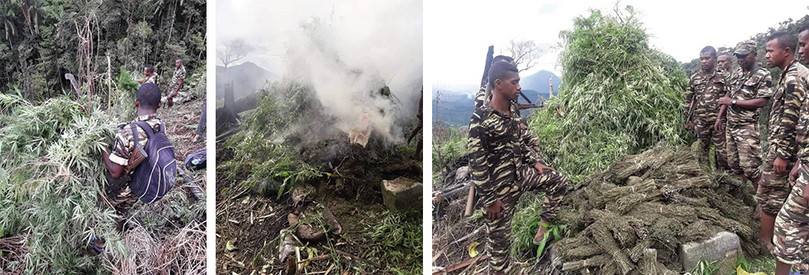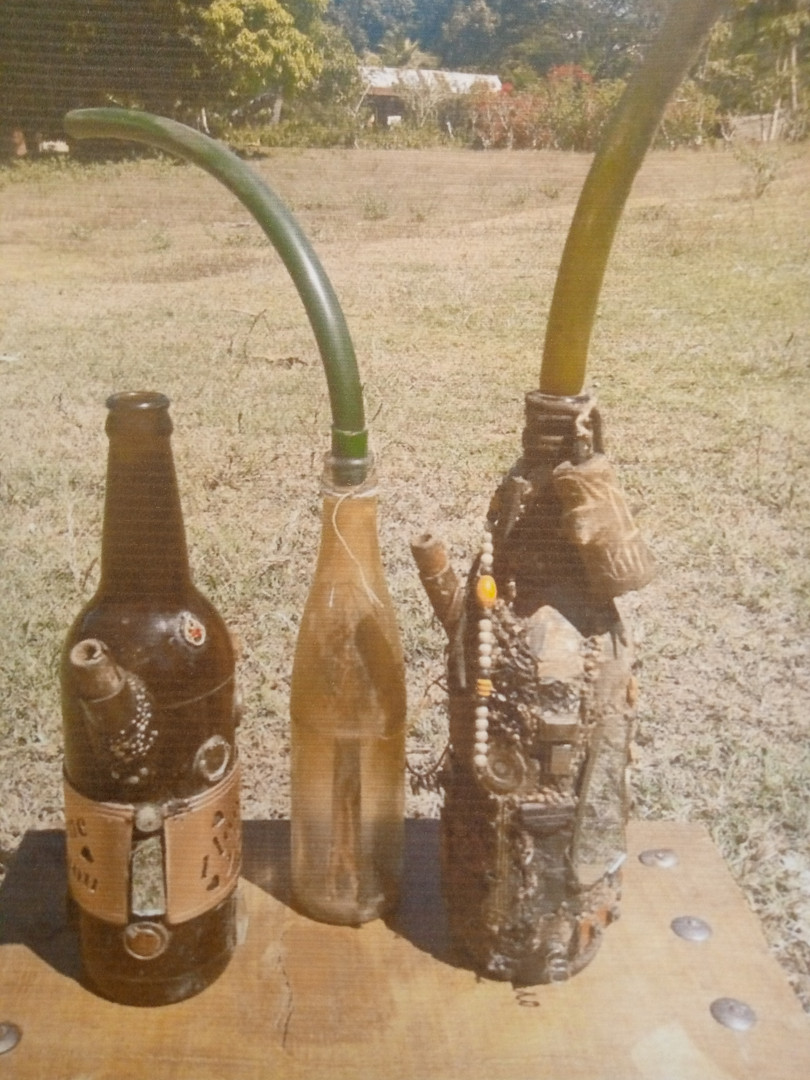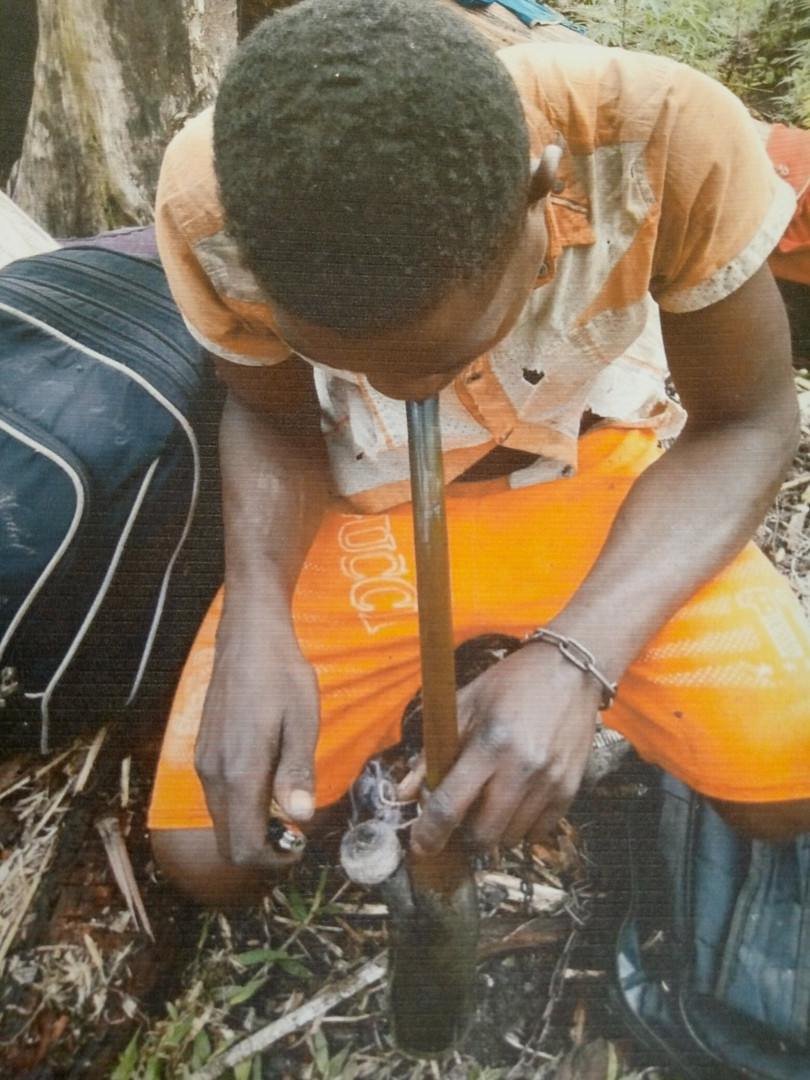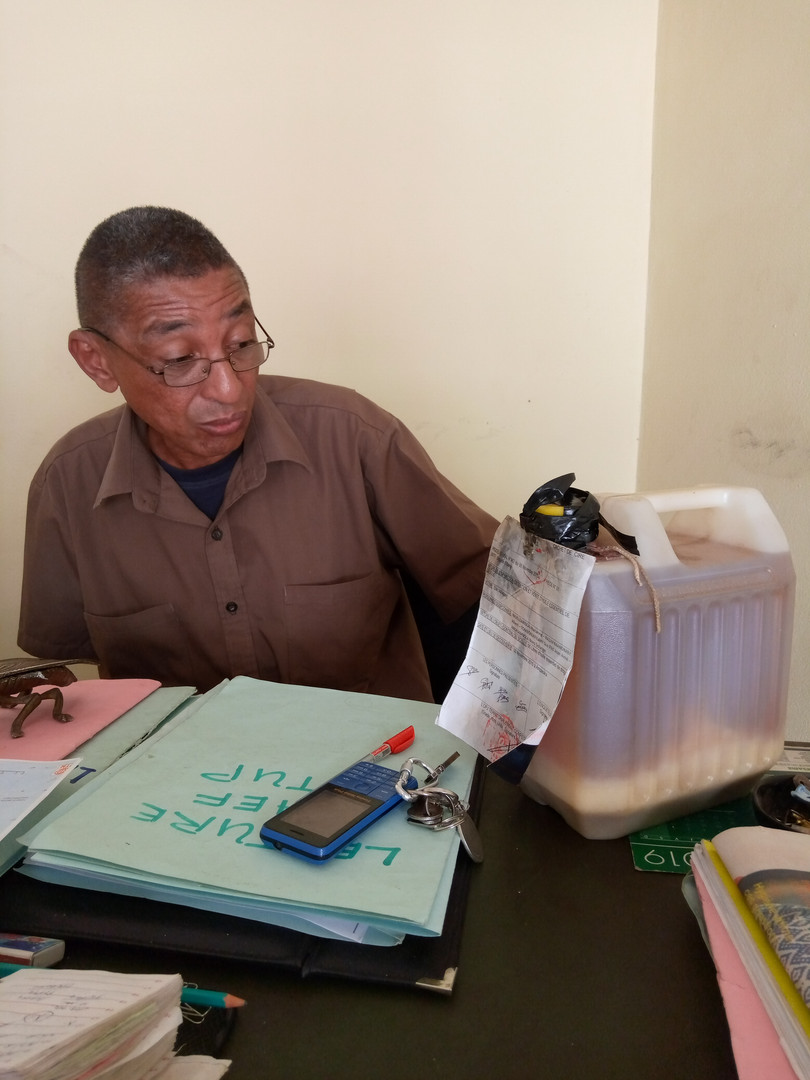As decriminalization of cannabis production gathers pace in East and southern Africa, Madagascar’s large-scale cannabis market remains a criminal enterprise.
The rural commune of central Antsahabe in northern Madagascar is a fertile region for agriculture: cash crops such as cocoa, coffee, and the vanilla for which Madagascar is famous are all produced here. Yet there is another crop that is a major source of income for communities in the region: cannabis.
Despite Madagascar being a large-scale producer of cannabis, with high levels of domestic consumption, cultivation, sale and consumption of cannabis are strictly illegal in Madagascar. The situation remains even as legalization for medicinal and recreational use is fast becoming a reality elsewhere in eastern and southern Africa.1
‘At the economic level, cannabis could be a very profitable source of revenue for local authorities,’ said Mr Armel, the mayor of Antsahabe. ‘The risk lies in management at the level of public health and local consumption.’2 Currently, Armel’s administration draws no benefit from the cannabis market, which in the Antsahabe commune alone is estimated to produce at least 200 tonnes per year.3
The mountainous region Analabe, part of the Ambanja district where Antsahabe is located, is one of the primary regions of cannabis cultivation in Madagascar. Yet Armel’s wish that cultivation could be transformed into a profitable and regulated legal market faces challenges: political resistance to cannabis legalization, the environmental impact of cannabis production and insecurity in remote cannabis-producing areas.
Regional trends towards decriminalization
In 2017, Lesotho became the first country in Africa to issue licenses for the production of medicinal cannabis, which has quickly led to large-scale international investment to develop the sector in the landlocked mountain kingdom.4 In April 2021, one Lesotho-based cannabis producer received the first approval for an African company to sell medicinal cannabis in the EU.5
Other countries in eastern and southern Africa have since followed suit. In October 2020, Rwanda became the latest country in the region to approve medical cannabis production for export,6 following in the footsteps of Uganda,7 Malawi, Zimbabwe and Zambia.8
South Africa, which in 2018 became the first country in the region to legalize cannabis production and consumption for recreational use (but not for sale) through a ruling by its Constitutional Court, recently released a draft national master plan for the development of the commercial cannabis market, for both local consumption and export.9
In the Seychelles, cannabis use for medicinal purposes (but not cultivation as a crop) was approved by law in July 2020.10 The development was welcomed by some activists in the island nation as a step towards liberalizing the law and the potential future approval of cannabis for recreational use.11 In the lead-up to presidential elections in late 2020, Alain St. Ange, leader of the One Seychelles party and former minister of tourism, argued that the Seychelles could benefit from ‘cannabis tourism’ by legalizing it for recreational use,12 which sparked debate in local media.13 Likewise, there is a significant lobby for legalization in Mauritius, although cultivation and use remain criminalized.14
These developments have led to optimistic analysis that the crop could be a new ‘green gold’ for Africa.15 A report by the cannabis-industry research group Prohibition Partners estimated that, by 2023, the cannabis market across the whole of Africa could be worth approximately US$7.1 billion.16 Another analysis, from strategy consultancy Birguid, estimated that the cannabis market in southern Africa alone generated just over US$1 billion in revenue in 2019, primarily from the illegal recreational market.17

Figure 2 Cannabis production hotspots and trafficking flows in and from Madagascar, and quantity of cannabis seized in each region by the Gendarmerie Nationale in 2020.
Note: The Gendarmerie is not the only authority that makes drugs seizures in Madagascar: the national police and customs authorities also make seizures in their respective jurisdictions. The Gendarmerie seizures, however, are indicative of major cannabis production areas and trafficking points.
Source: Madagascar Gendarmerie Nationale.
In several ways, the cannabis market in Lesotho parallels that of Madagascar. The mountainous ranges of both countries provide environments well suited to growing cannabis. In both countries, cannabis was grown traditionally for many years before being criminalized under colonial rule, and cultivation then continued as an illicit market supplementing the incomes of subsistence-farming communities.18 Politically, however, it seems that Madagascar is showing no sign of following Lesotho’s lead.
In the countries that have embraced the development of cannabis markets, whether for medicinal, industrial (such as for hemp production) or recreational purposes, the policy shift is widely expected to bring economic benefit. Yet regulating the sector has its challenges. In Lesotho, for example, small-scale local growers have faced steep fees for cannabis-production licenses, which some say sways the market in favour of multinational companies and forces smaller growers onto the black market.19 Allegations have also emerged of corruption in the allocation of licenses.20
In Zambia, Peter Sinkamba, president of the opposition Green Party, summed up how the benefits of cannabis production may also bring risks: ‘Depending on how properly this is done, this could just change the face of Zambia’s economy,’ he said in an interview with Reuters. ‘This could be a blessing or a curse, like diamonds and gold, depending on the policy direction.’21
Figure 3 Cannabis prices in the Indian Ocean islands, 2020.
Note: GI-TOC drug pricing surveys in Indian Ocean islands found that cannabis prices in Madagascar were on average 0.03 USD per gram in 2020, the lowest recorded in the islands. This reflects the large supply of cannabis grown domestically in Madagascar. In Mauritius, cannabis prices have risen significantly in recent years to the point it is described as a ‘luxury’ item.
Source: Based on findings from GI-TOC drug pricing surveys in the island states, 2020.
Cannabis production in Madagascar
Madagascar is the most significant producer of cannabis among the western Indian Ocean islands. The major regions of production – Betroka in the south and Analabe in the north – largely supply domestic markets, particularly Madagascar’s urban centres, including the capital, Antananarivo. Some cannabis is also smuggled to other island states, including the Seychelles, Mauritius, the Comoros and Mayotte.22 GI-TOC research has found that at around US$0.03 per gram (in 2020), cannabis prices in Madagascar are far lower than in the other island states (as shown in Figure 3), reflecting a plentiful domestic supply.23
Consumption and sale of cannabis in Madagascar are widespread. Reliable estimates of consumption are not widely available, but figures do suggest high levels of recreational use. The latest statistics reported by the Malagasy government to the UN Office on Drugs and Crime’s annual data-gathering exercise indicate a 9.1% prevalence of cannabis use among the adult population; 24 which would place Madagascar among the highest rates in Africa. This figure, however, dates from 2004. Cannabis research consultancy New Frontier Data reported in 2019 that 14.2% of the adult population of Madagascar had reported using cannabis in the past year,25 which would equate to over 2 million people and place Madagascar as having the ninth highest rate of use in Africa.26
Estimates for the amount of cannabis produced in Madagascar are also elusive, yet reports from law enforcement operations give a sense of its scale. Madagascar’s Gendarmerie Nationale seized close to 53 tonnes of cannabis in 2020,27 which included multiple seizures of more than 1 tonne.28 In May and June 2020, an operation by the gendarmerie unit of Antsiranana, which oversees the region of Analabe Ambanja, seized more than 16 tonnes of cannabis and 21 litres of cannabis oil, destroyed over 80 000 individual cannabis plants, and led to the arrest of 80 people.29
‘Millions, even billions, of ariary of profit are circulating in the sector, especially in the production zones of Analabe in the Ambanja district and that of the district of Betroka. Likewise, for the consumption zones like Antananarivo, cannabis brings in profit for big bosses and dealers,’ said Tantely Ramamonjisoa, commissioner of the antinarcotics division of the national police. ‘Big sums of money are at stake, which leads to the difficulty of eradicating this danger from society,’ he concluded.30
Analabe Ambanja: A centre for cannabis production
According to Armel, the Analabe region attracts trafficking networks from across the country. ‘There are traffickers coming from Mahajanga, Antananarivo and other provinces of Madagascar,’ he said.31 Testimony from residents of Antsahabe and the surrounding area confirmed that hundreds of traffickers operate clandestinely in the area.32

Madagascar’s Gendarmerie Nationale carry out an operation to destroy cannabis fields in Analabe, Ambanja district, in the north of Madagascar. In this operation, which took place in July 2020, over 100 hectares of cannabis were burned and more than a dozen cannabis farmers were arrested.
Photo: Gendarmerie Nationale, Madagascar

A bottle used to inhale cannabis oil, Analabe Ambanja, February 2021.
Photo: Riana Raymonde Randrianarisoa

The mountainous region of Analabe Ambanja, in northern Madagascar, is a hub for cannabis production. Here, a local resident demonstrates how cannabis oil is inhaled through a bottle.
Photo: Riana Raymonde Randrianarisoa
Although some residents collaborate with law enforcement officials, serving as informers or guides in remote areas, a significant proportion of the population cooperates with trafficking networks. Local young people work with cannabis producers in cannabis fields or participate in transporting cannabis to and from collection points, using their knowledge of the local terrain.33 Cannabis production is a source of revenue for many residents in the region.34
Cannabis is transported on foot, with journeys continuing for two days or more. Produce is taken from the fields to either trucks (for transport to urban markets) or warehouses in neighbouring cities such as Ambilobe. ‘For the transit from Analabe to Ambanja town, there are several options. Either over land, by car or on foot, or transferred by river. Finally there is the sea route for exports destined to the Comoros, Mayotte and other Indian Ocean islands. These journeys earn money, and there are enormous sums invested,’ said Armel.35 The gendarmerie unit in Ambanja also reported that there are artisanal factories that produce cannabis oil in the region, yet these locations have not been identified by police.36
Those in charge of trafficking networks invest large sums to purchase cannabis, transport it and secure safe delivery. According to members of the local community in Analabe, local farmers may sell a kilogram of green cannabis at 20 000 ariary (AR). This is reportedly comparable to prices for cocoa, which depending on the season will sell for around AR25 000. Traffickers’ expenses for ensuring safe transport of the product to warehouses (for example, in Antananarivo) can amount to more than that sum per kilogram. ‘But this amount varies, according to the trafficker involved,’ explained Tombo Simon, a young dealer based in Ambanja. ‘In our experience, from time to time and especially when we have more orders than usual, the transporters and farmers raise their prices. They also play on the rule of supply and demand,’ he added. When finally sold to consumers, a kilogram of cannabis can earn a trafficker between AR100 000 and AR150 000.37
‘They shoot without warning’
Local government figures such as Armel and members of the community expressed their support for creating a legalized cannabis market as a way of regularizing the profits and livelihoods that the trade brings to the local area.38 However, creating a controlled and regulated market would face serious challenges. Slash-and-burn agriculture, as used in cannabis production, has been identified as a leading cause of deforestation in Madagascar’s northern reserves. These forests are home to many endangered species, several of which are unique to Madagascar.39
Communities also report that cannabis trafficking groups in Analabe are heavily armed and impose their own rule of law in production areas.40 Lieutenant Tahiana Antrefinomenjanahary, coordination officer at the Gendarmerie Nationale in Ambanja, said ‘law enforcement do not dare venture into this region [Analabe]. These are truly cartels who don’t hesitate to kill.’ This was confirmed during focus group discussions with local members of central Antsahabe.41 Research by the GI-TOC has previously identified similar dynamics in Betroka in the south of Madagascar.42
Colonel Mamy Marly Ramaromisamalala, head of the counter-narcotics unit in the high command of the Gendarmerie Nationale, gave more details. ‘In the case of Analabe Ambanja, even the gendarmes cannot venture into the forests, because the traffickers have Kalashnikovs. They shoot without warning … all military interventions in these regions demand specific precautions. We are very careful, because the traffickers benefit from their mastery of the terrain and support of the surrounding inhabitants.’
Lieutenant Tahiana Antrefinomenjanahary regards the cannabis market as a major factor in criminality and insecurity in the Analabe region. In his view, and also that of other law enforcement bodies in the region, the fight against organized cannabis-trafficking groups is one of their key priorities.43 In contrast, other drugs markets in Madagascar, such as for heroin and cocaine, are not associated with high levels of violence. Previous GI-TOC research suggested that, at a national level, countering drugs markets has not been as high a priority for law enforcement as, for example, illegal trade in natural resources and wildlife.
Police resources in Madagascar are limited, which have rendered it difficult for police to control a vast and criminalized cannabis market effectively. In Madagascar’s cities there is, on average, only one officer of the national police for every 3 000 inhabitants; in rural areas, where the Gendarmerie Nationale has jurisdiction, there is one gendarme for every 4 000 residents.44
According to Raherimaminirainy Zoly Miandrisoa, former commander of the Gendarmerie Nationale brigade at Djamanjary on the island of Nosy Be, law enforcement in Madagascar does not have sufficient means to pursue cases of international export of cannabis. ‘For the moment, we are content with local arrests of consumers and dealers,’ he reported.45

Colonel Mamy Marly Ramaromisamalala, head of the counter-narcotics unit in the high command of the Gendarmerie Nationale, displays a seized container filled with cannabis oil, February 2021.
Photo: Riana Raymonde Randrianarisoa
One widely used argument in favour of creating legal cannabis markets is that it could free up overstretched police resources to be used in countering more serious and violent crimes. Yet in Analabe, creating an effective regulated market would mean confronting groups involved in the cannabis market who present a violent challenge to the rule of law.
Not a political possibility in the near future
The legalization of cannabis in Madagascar, for any purpose, does not seem to be a major political possibility in the near future, in contrast to the situation in other countries in the region. The optimism of the population of Analabe and local political leaders has not yet resulted in a political shift at the national level. If Madagascar were to follow the example of other eastern and southern African countries, any new policy would face a complex balance between the potential economic benefit to rural communities, governance issues endemic in cannabis-producing regions, and concerns about the effect on biodiversity and the unique ecosystems of Madagascar.
Notes
-
Madagascar’s law 97-039, which governs control of narcotic drugs, also applies to cannabis. Available at: http://www.justice.mg/wp-content/uploads/textes/1TEXTES%20NATIONAUX/DROIT%20PRIVE/Textes%20sur%20le%20penal/lois/Loi%2097-039.pdf. ↩
-
Interview, Mayor Armel, Antsahabe, February 2021. ↩
-
Ibid. ↩
-
Emma Vickers, Cannabis kingdom: High hopes and early stumbles in Lesotho, CannabisWire, 9 November 2019, https://cannabiswire.com/2019/11/09/cannabis-kingdom-high-hopes-and-early-stumbles-in-lesotho. ↩
-
Luke Daniel, A Lesotho dagga grower just landed Africa’s first approval to sell to the EU, Business Insider South Africa, 16 April 2021, https://www.businessinsider.co.zaa-lesotho-dagga-grower-just-landed-africas-first-approval-to-sell-to-the-eu-2021-4. ↩
-
Ivan R Mugisha, Fred Oluoch and Halima Abdallah, East Africa could become a major cannabis export hub, 17 October 2020, https://www.businessinsider.co.za/a-lesotho-dagga-grower-just-landed-africas-first-approval-to-sell-to-the-eu-2021-4. ↩
-
AfricaNews, Uganda to issue guidelines for growing, exporting marijuana, 28 January 2020, https://www.africanews.com/2020/01/28/uganda-to-issue-guidelines-for-growing-exporting-marijuana//; Liam Taylor, On a high: Growing cannabis in Uganda, African Business, 12 January 2021, https://african.business/2021/01/trade-investment/on-a-high-growing-cannabis-in-uganda/. ↩
-
Daniel Mumbure, Malawi becomes latest African country to embrace cannabis, 28 February 2020, https://www.africanews.com/2020/02/28/african-countries-embrace-cannabis-zambia-south-africa-zimbabwe-lesotho//. ↩
-
Cannabiz Africa, Let the games begin: National cannabis master plan finally surfaces, call for public input, 29 March 2021, https://www.cannabiz-africa.com/national-cannabis-master-plan/. Full text of the draft plan is available here: https://www.cannabiz-africa.com/sa-cannabis-master-plan-v5/. ↩
-
Misuse of drugs (Cannabidiol-based products for medical purposes) Regulations 2020, https://seylii.org/sc/legislation/si/2020/25-0. ↩
-
Seychelles News Agency (via AllAfrica), Legalisation of medical cannabis in Seychelles takes step forward, 13 May 2020, https://allafrica.com/stories/202005130674.html. ↩
-
Alain St Ange, One Seychelles’ drive toward the legalization of marijuana, LinkedIn post, published 9 July 2020, https://www.linkedin.com/pulse/one-seychelles-drive-toward-legalization-marijuana-alain-st-ange/?articleId=6686924765749403648; Özgür Töre, Would you like to travel to Seychelles for marijuana tourism?, FTN News, 19 August 2020, https://ftnnews.com/tours/40103-would-you-like-to-travel-to-seychelles-for-marijuana-tourism. ↩
-
Today in Seychelles, The great cannabis debate!, 2 October 2020, available at: https://web.facebook.com/todayinsey/posts/friday-2-october-2020the-great-cannabis-debateis-seychelles-ready-for-the-legali/3337116889659431/?_rdc=1&_rdr. ↩
-
Some stakeholders see this as a key element of the response to exploding synthetic cannabinoid use in Mauritius. ↩
-
Julien Clémençot, Cannabis: An African green gold rush, The Africa Report, 6 November 2019, https://www.theafricareport.com/19723/cannabis-an-african-green-gold-rush/. ↩
-
Prohibition Partners, Africa cannabis market could be worth over $US 7.1 billion annually by 2023, 21 March 2019, https://prohibitionpartners.com/2019/03/21/africas-legal-cannabis-market-could-be-worth-over-us-7-1-billion-annually-by-2023/. ↩
-
James Maposa, Southern Africa’s cannabis industry offers opportunity for open-minded investors, 8 May 2020, https://mg.co.za/opinion/2020-05-08-southern-africas-cannabis-industry-offers-opportunity-for-open-minded-investors/; Birguid, Southern African cannabis industry analysis, April 2020 (executive summary available from: http://birguid.co.za/master/download_files/2020-05-11_Birguid_Southern_African_Cannabis_Industry_Analysis_14.04.2020_EXEC_SUMMARY.pdf). ↩
-
Emma Vickers, Cannabis kingdom: High hopes and early stumbles in Lesotho, CannabisWire, 9 November 2019, https://cannabiswire.com/2019/11/09/cannabis-kingdom-high-hopes-and-early-stumbles-in-lesotho/. ↩
-
Emma Vickers, Cannabis kingdom: High hopes and early stumbles in Lesotho, CannabisWire, 9 November 2019, https://cannabiswire.com/2019/11/09/cannabis-kingdom-high-hopes-and-early-stumbles-in-lesotho/. ↩
-
Majirata Latela, Minister probes cannabis licensing, The Reporter Lesotho, 26 August 2020, https://www.thereporter.co.ls/2020/08/26/minister-probes-cannabis-licensing/ ↩
-
Daniel Mumbure, Malawi becomes latest African country to embrace cannabis, 28 February 2020, https://www.africanews.com/2020/02/28/african-countries-embrace-cannabis-zambia-south-africa-zimbabwe-lesotho//. ↩
-
Interview, Colonel Marly Mamy Ramaromisamalala, head of counter-narcotics in the high command of the Gendarmerie Nationale, 26 February 2021, by phone. ↩
-
Information gathered in GI-TOC field research, June and July 2020. ↩
-
Available at: https://dataunodc.un.org/data/drugs/Prevalence-general (accessed 20/4/21). Note that this figure is used to calculate the cannabis consumption rate in the Prohibition Partners’ Africa Cannabis Report, 2019. Available for download from: https://prohibitionpartners.com. ↩
-
New Frontier Data, Top cannabis usage by country, 28 April 2019, https://newfrontierdata.com/cannabis-insights/cannabis-usage-by-country/. ↩
-
420 Intel, These are the top 10 cannabis-consuming countries in Africa, 31 May 2019, https://420intel.com/articles/2019/05/31/these-are-top-10-cannabis-consuming-countries-africa. ↩
-
Information shared with the GI-TOC by the Gendarmerie Nationale, February 2021. ↩
-
For example: Hajatiana Léonard, Ambanja – six tonnes de cannabis saisies [six tonnes of cannabis seized], l’Express Madagascar, 22 December 2020, https://lexpress.mg/22/12/2020/ambanja-six-tonnes-de-cannabis-saisies/, Hajatiana Léonard, Ambanja – près de trois tonnes de cannabis saisies [close to three tonnes of cannabis seized], l’Express Madagascar,14 October 2020, https://lexpress.mg/14/10/2020/ambanja-pres-de-trois-tonnes-de-cannabis-saisis/. ↩
-
Information shared by the communication and public relations service of the Gendarmerie Nationale, February 2021. ↩
-
Interview, Commissioner Tantely Ramamonjisoa, February 2021. ↩
-
Interview, Mayor Armel, Antsahabe, February 2021. ↩
-
Testimony from residents of the fokontany (local government areas) of Antanambao Amboangisay, Antahavary, Bizogno and central Antsahabe, Ambanja district, February 2021. ↩
-
This information was confirmed by local residents and the regional compagnie territoriale of the gendarmerie. ↩
-
Interviews and focus groups with local residents, Analabe, February 2021. ↩
-
Interview, Mayor Armel, Antsahabe, February 2021, translated from French. ↩
-
Information shared by the gendarmerie unit at Ambanja, February 2021. ↩
-
Interview, Tombo Simon (name has been changed), Ambanja, February 2021, translated from French. ↩
-
Interview, Mayor Armel, Antsahabe, February 2021. ↩
-
Edward Carver, Marijuana cultivation whittling away Madagascar’s largest connected forest, Mongabay, 29 May 2020, https://news.mongabay.com/2020/05/marijuana-cultivation-whittling-away-madagascars-largest-connected-forest/. ↩
-
Interviews and focus groups with local residents, Analabe, February 2021. ↩
-
Interview, Lieutenant Tahiana Antrefinomenjanahary, coordination officer at the Gendarmerie Nationale, Ambanja, February 2021. ↩
-
Global Initiative against Transnational Organized Crime, Civil society observatory of illicit economies in Eastern and Southern Africa, Risk Bulletin, Issue 11, August-September 2020, https://globalinitiative.net/analysis/esaobs-risk-bulletin-11/. ↩
-
Interview, Lieutenant Tahiana Antrefinomenjanahary, coordination officer at the Gendarmerie Nationale, Ambanja, February 2021. ↩
-
Information shared by the human resources service of the ministry of public security in Madagascar, and the public relations department of the Gendarmerie Nationale, February 2021. ↩
-
Interview, adjoint chief, Raherimaminirainy Zoly Miandrisoa, former commander of the Gendarmerie Nationale brigade at Djamanjar, Nosy Be, February 2021. ↩
